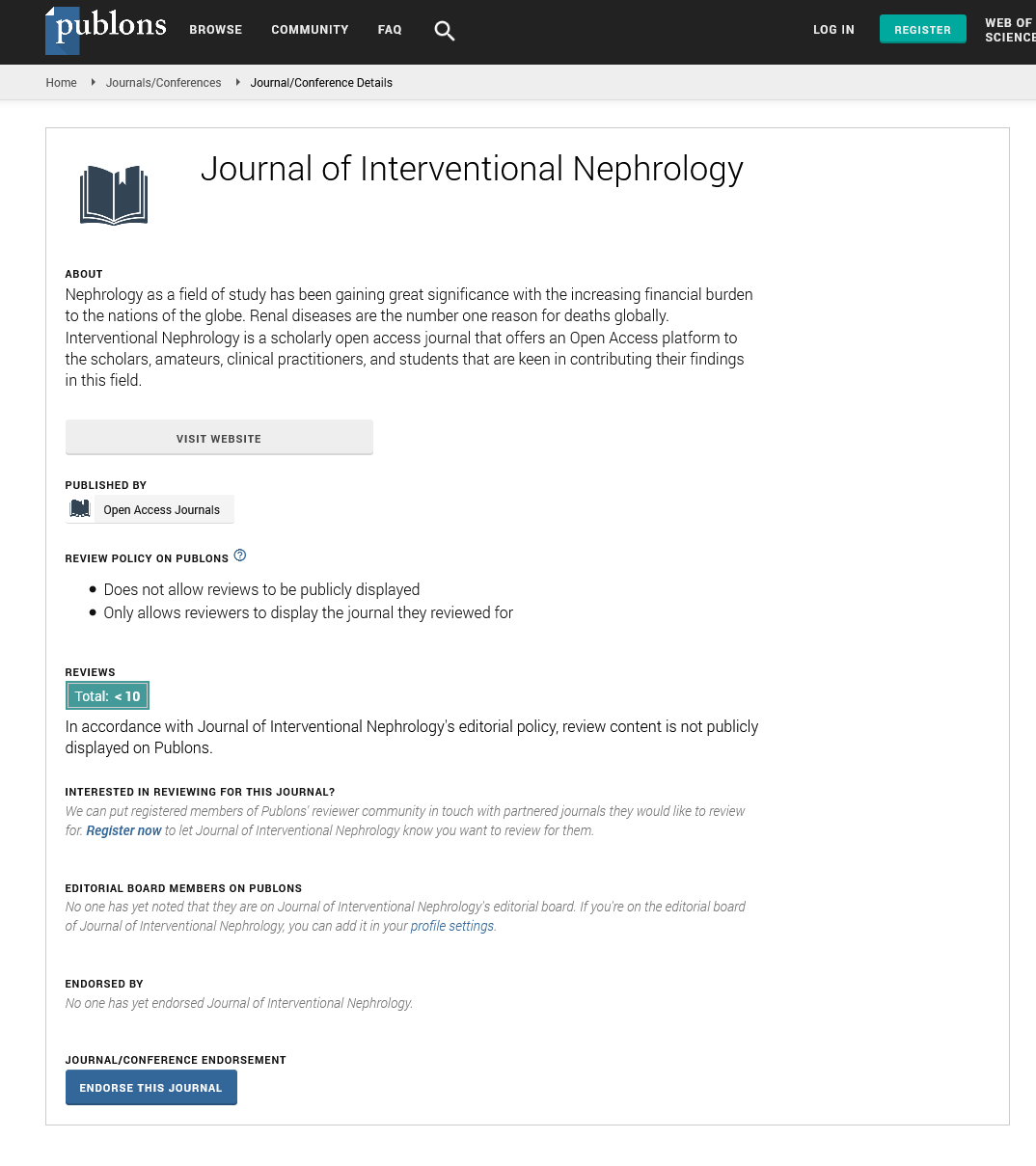Perspective - Journal of Interventional Nephrology (2024) Volume 7, Issue 5
Impact of Interventional Nephrology on Outcomes in Chronic Kidney Disease
- Corresponding Author:
- Dazhuo Jiang
Department of Nephrology,
Emory University,
China
E-mail: JDazhuo001@EN.edu
Received: 29-Jul-2024, Manuscript No. OAIN-24-143614; Editor assigned: 31-Jul-2024, PreQC No. OAIN-24-143614 (PQ); Reviewed: 13-Aug-2024, QC No. OAIN-24- 143614; Revised: 04-Oct-2024, Manuscript No. OAIN-24-143614 (R); Published: 11-Oct-2024, DOI: 10.47532/oain.2024.7(5).306-307
Introduction
Chronic Kidney Disease (CKD) is a progressive condition characterized by a gradual decline in kidney function over time. Effective management of CKD is crucial in slowing disease progression, mitigating complications, and improving patients’ quality of life. Interventional nephrology, a subspecialty focusing on minimally invasive procedures to manage kidney-related conditions, has become increasingly influential in CKD management. This article examines the impact of interventional nephrology on CKD outcomes, exploring its contributions to diagnosis, treatment, and patient care.
Description
Advancements in diagnosis and monitoring
• Minimally invasive renal biopsy: Renal
biopsy, an essential tool in diagnosing
and classifying CKD, has evolved
with advances in imaging and biopsy
techniques. Percutaneous renal biopsy,
guided by ultrasound or CT, provides
valuable tissue samples for diagnosing
glomerular diseases, assessing disease
activity, and tailoring treatment strategies.
Improved techniques have enhanced the
safety and accuracy of biopsies, reducing
complications and aiding in the precise
diagnosis of CKD.
• Advanced imaging techniques: Interventional nephrology employs advanced
imaging modalities such as Doppler
ultrasound, CT angiography, and MRI to
monitor CKD progression and evaluate
renal vasculature. These technologies help in
assessing renal blood flow, detecting vascular
abnormalities, and planning interventions,
thereby improving disease management and outcome prediction.
Dialysis access and management
• Optimizing dialysis access: For patients
with advanced CKD requiring renal
replacement therapy, interventional
nephrology plays a critical role in
establishing and maintaining dialysis
access. The creation of Arteriovenous
Fistulas (AVFs) or Arteriovenous Grafts
(AVGs) and the placement of Central
Venous Catheters (CVCs) are essential
procedures that influence dialysis
efficacy and patient quality of life. The
development of new technologies and
techniques has improved the durability
and functionality of dialysis access,
leading to better clinical outcomes.
• Management of access complications: Complications related to dialysis access,
such as thrombosis, infection, and
stenosis, can significantly impact patient
outcomes. Interventional nephrologists
utilize techniques such as angioplasty,
stenting, and catheter exchange to
manage these complications effectively. By
addressing access-related issues promptly,
interventional nephrology helps to
ensure uninterrupted dialysis therapy and
improved patient health.
Treatment of renal complications
• Treatment of secondary hyperparathyroidism: Secondary hyperparathyroidism is a
common complication in CKD, often
requiring surgical or interventional
management. Techniques such as
percutaneous parathyroid ablation and
focused parathyroidectomy can effectively
reduce parathyroid hormone levels,
alleviating symptoms and improving
mineral metabolism.
• Management of obstructive uropathy: In
CKD patients with obstructive uropathy,
interventional nephrology offers solutions
such as percutaneous nephrostomy to
relieve urinary obstruction. This procedure
helps to restore renal function and prevent
further deterioration of kidney health.
Patient-centered care and quality of life
• Improving quality of life: Interventional
nephrology focuses not only on clinical
outcomes but also on enhancing patient
quality of life. Minimally invasive procedures,
effective management of complications, and
timely interventions contribute to reduced
hospitalizations, improved symptoms, and
overall better patient satisfaction.
• Personalized treatment plans: Interventional
nephrologists play a crucial role in
developing personalized treatment plans for
CKD patients. By integrating diagnostic
findings, patient preferences, and individual
health conditions, nephrologists can tailor
interventions to optimize outcomes and
address specific patient needs.
Future directions and innovations
• Emerging technologies: The field of
interventional nephrology is continuously
evolving with innovations such as roboticassisted
procedures, enhanced imaging
techniques, and novel biomaterials for
dialysis access. These advancements have the potential to further improve procedural
accuracy, reduce complications, and
enhance patient outcomes.
• Research and evidence-based practices: Ongoing research into the efficacy of
various interventional techniques and their
impact on CKD outcomes is essential for
advancing practice standards. Evidencebased
approaches and clinical trials will
continue to refine treatment strategies and
contribute to better management of CKD.
Conclusion
Interventional nephrology has significantly impacted the management of Chronic Kidney Disease, offering innovative solutions that improve diagnosis, treatment, and patient care. Through advancements in biopsy techniques, dialysis access management, and the treatment of CKD-related complications, interventional nephrology enhances clinical outcomes and quality of life for patients. As the field continues to advance, ongoing research and technological innovations will further shape the future of CKD management, promising even greater benefits for patients and the healthcare system.In summary, the integration of interventional nephrology into CKD management represents a transformative approach that combines precision, safety, and patient-centered care to optimize outcomes and elevate the standard of nephrology practice.


